INFS 5024: ERP Implementation Proposal for Nestle Company Report
VerifiedAdded on 2023/06/08
|9
|939
|208
Report
AI Summary
This report proposes an ERP implementation for Nestle, addressing challenges in security, procurement, communication, and human resources. It suggests using the SAP ECC ERP system to coordinate operations, improve efficiency, and enhance customer relations. The implementation plan includes training, infrastructure procurement, testing, transition, and continuous evaluation. The proposed SAP business suite covers customer relationship management, supplier relationship management, supply chain management, product lifecycle management, and human resource capital. The report highlights the advantages of adoption, such as coordinated operations, cost savings, and increased profitability. It also includes a bibliography of relevant sources.
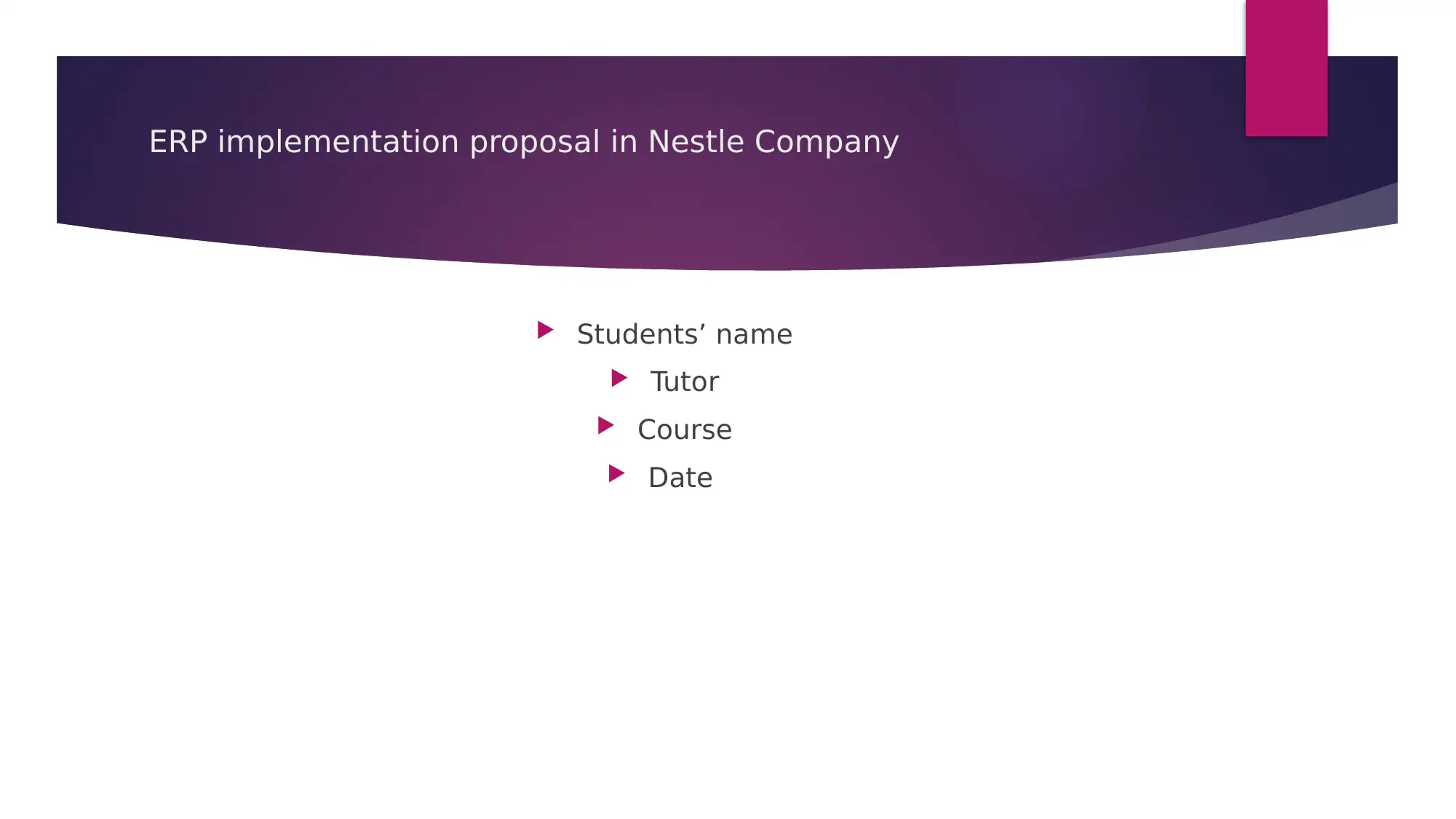
ERP implementation proposal in Nestle Company
Students’ name
Tutor
Course
Date
Students’ name
Tutor
Course
Date
Paraphrase This Document
Need a fresh take? Get an instant paraphrase of this document with our AI Paraphraser
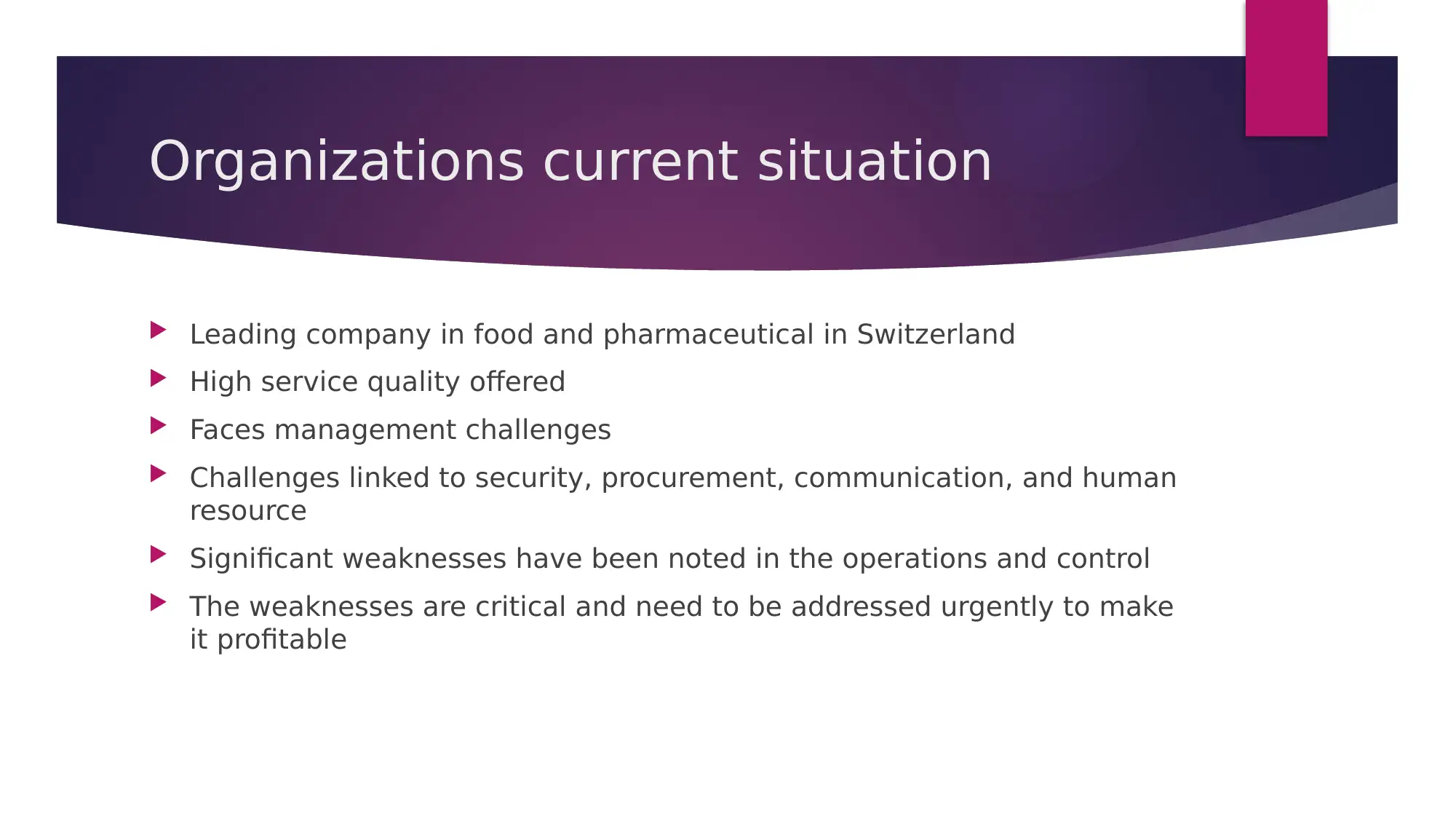
Organizations current situation
Leading company in food and pharmaceutical in Switzerland
High service quality offered
Faces management challenges
Challenges linked to security, procurement, communication, and human
resource
Significant weaknesses have been noted in the operations and control
The weaknesses are critical and need to be addressed urgently to make
it profitable
Leading company in food and pharmaceutical in Switzerland
High service quality offered
Faces management challenges
Challenges linked to security, procurement, communication, and human
resource
Significant weaknesses have been noted in the operations and control
The weaknesses are critical and need to be addressed urgently to make
it profitable
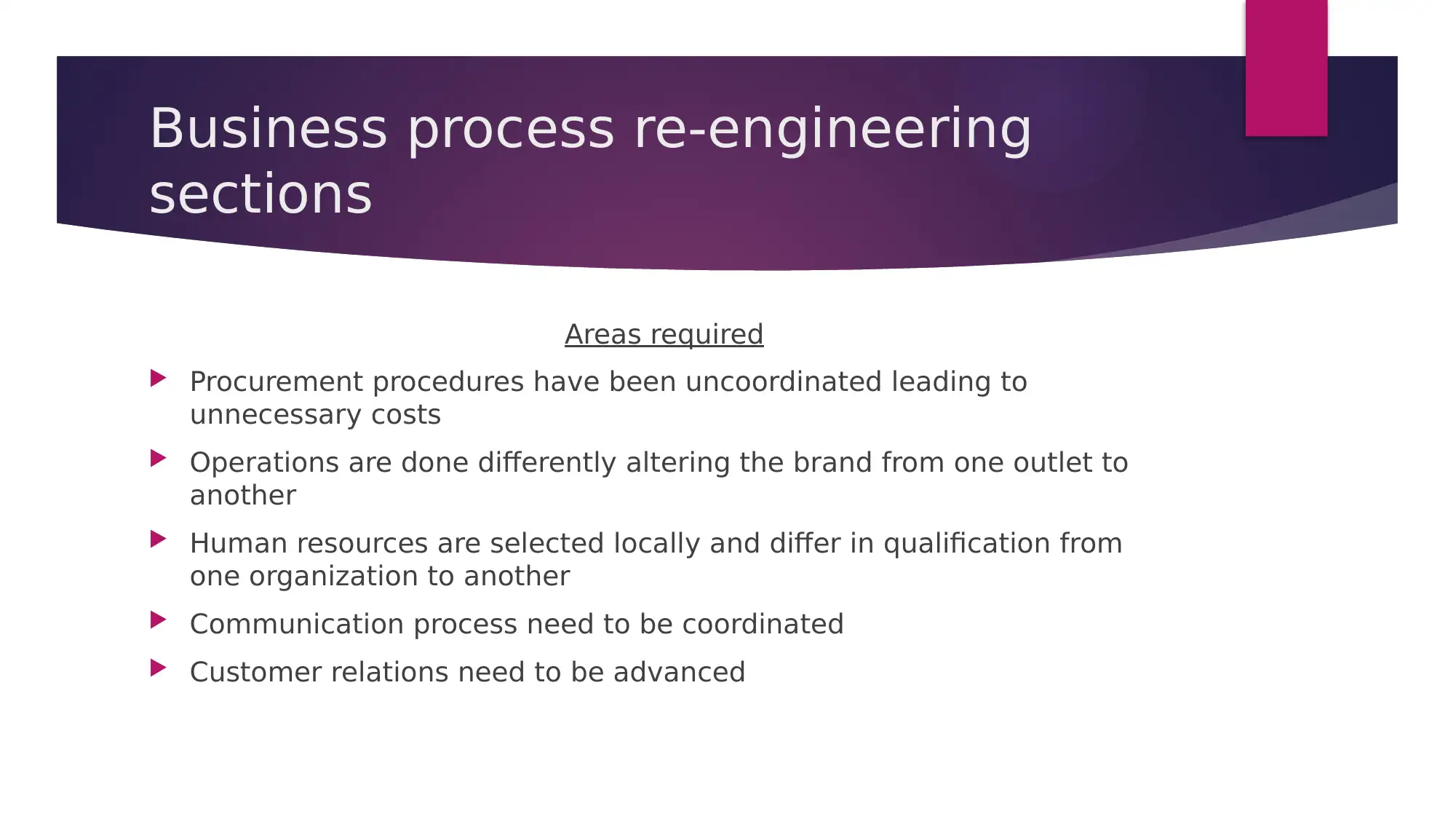
Business process re-engineering
sections
Areas required
Procurement procedures have been uncoordinated leading to
unnecessary costs
Operations are done differently altering the brand from one outlet to
another
Human resources are selected locally and differ in qualification from
one organization to another
Communication process need to be coordinated
Customer relations need to be advanced
sections
Areas required
Procurement procedures have been uncoordinated leading to
unnecessary costs
Operations are done differently altering the brand from one outlet to
another
Human resources are selected locally and differ in qualification from
one organization to another
Communication process need to be coordinated
Customer relations need to be advanced
⊘ This is a preview!⊘
Do you want full access?
Subscribe today to unlock all pages.

Trusted by 1+ million students worldwide
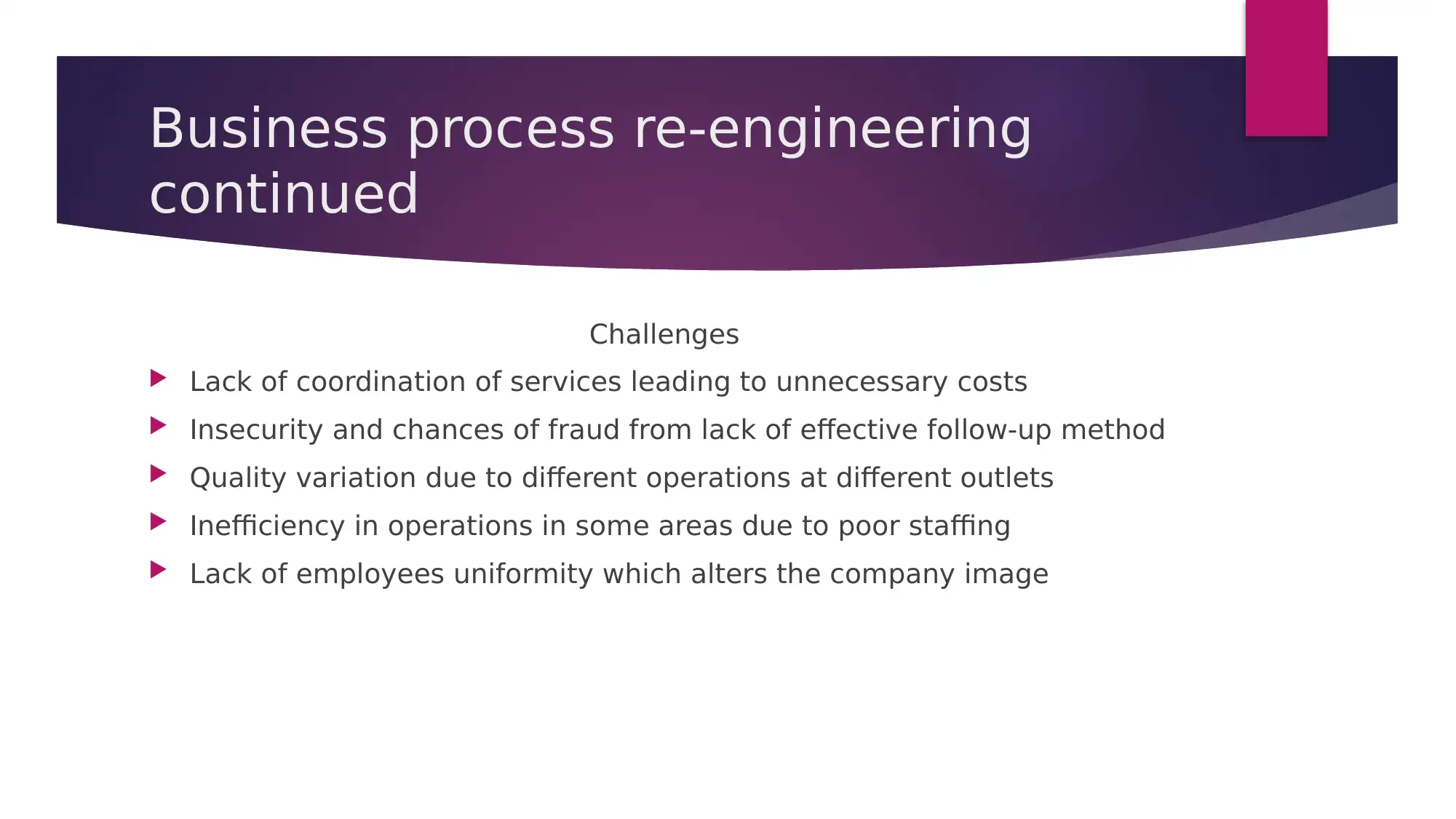
Business process re-engineering
continued
Challenges
Lack of coordination of services leading to unnecessary costs
Insecurity and chances of fraud from lack of effective follow-up method
Quality variation due to different operations at different outlets
Inefficiency in operations in some areas due to poor staffing
Lack of employees uniformity which alters the company image
continued
Challenges
Lack of coordination of services leading to unnecessary costs
Insecurity and chances of fraud from lack of effective follow-up method
Quality variation due to different operations at different outlets
Inefficiency in operations in some areas due to poor staffing
Lack of employees uniformity which alters the company image
Paraphrase This Document
Need a fresh take? Get an instant paraphrase of this document with our AI Paraphraser
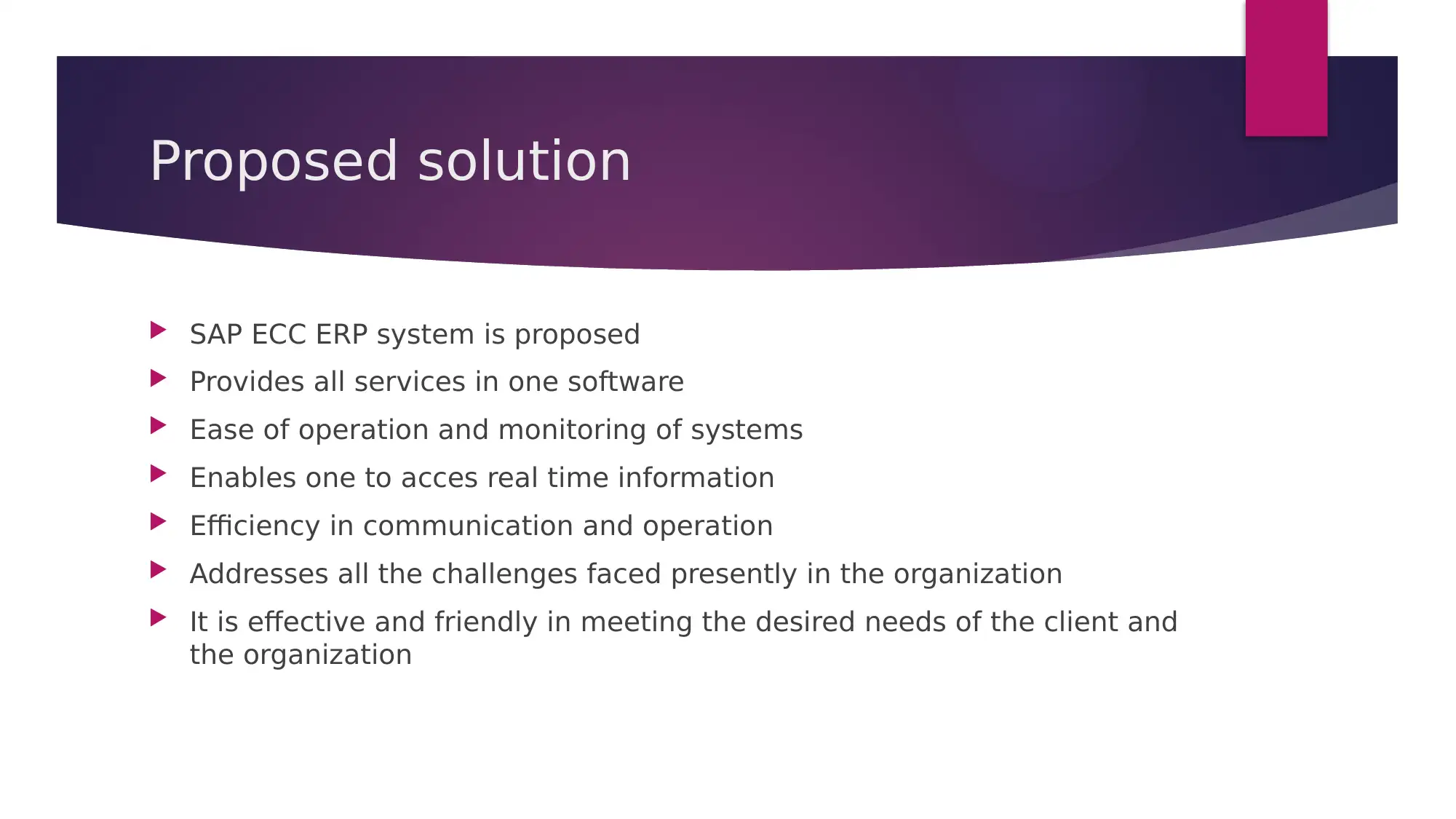
Proposed solution
SAP ECC ERP system is proposed
Provides all services in one software
Ease of operation and monitoring of systems
Enables one to acces real time information
Efficiency in communication and operation
Addresses all the challenges faced presently in the organization
It is effective and friendly in meeting the desired needs of the client and
the organization
SAP ECC ERP system is proposed
Provides all services in one software
Ease of operation and monitoring of systems
Enables one to acces real time information
Efficiency in communication and operation
Addresses all the challenges faced presently in the organization
It is effective and friendly in meeting the desired needs of the client and
the organization
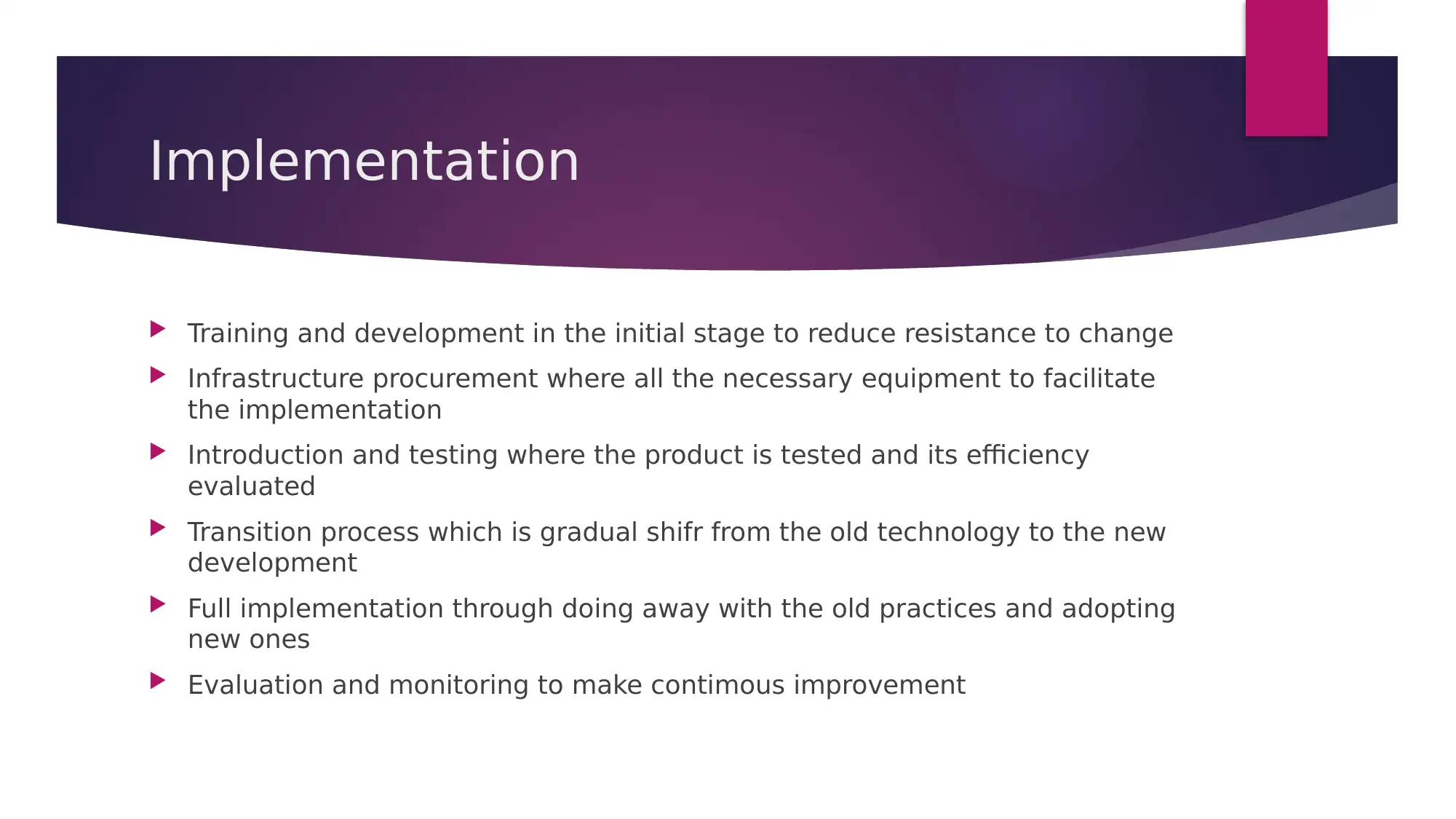
Implementation
Training and development in the initial stage to reduce resistance to change
Infrastructure procurement where all the necessary equipment to facilitate
the implementation
Introduction and testing where the product is tested and its efficiency
evaluated
Transition process which is gradual shifr from the old technology to the new
development
Full implementation through doing away with the old practices and adopting
new ones
Evaluation and monitoring to make contimous improvement
Training and development in the initial stage to reduce resistance to change
Infrastructure procurement where all the necessary equipment to facilitate
the implementation
Introduction and testing where the product is tested and its efficiency
evaluated
Transition process which is gradual shifr from the old technology to the new
development
Full implementation through doing away with the old practices and adopting
new ones
Evaluation and monitoring to make contimous improvement
⊘ This is a preview!⊘
Do you want full access?
Subscribe today to unlock all pages.

Trusted by 1+ million students worldwide
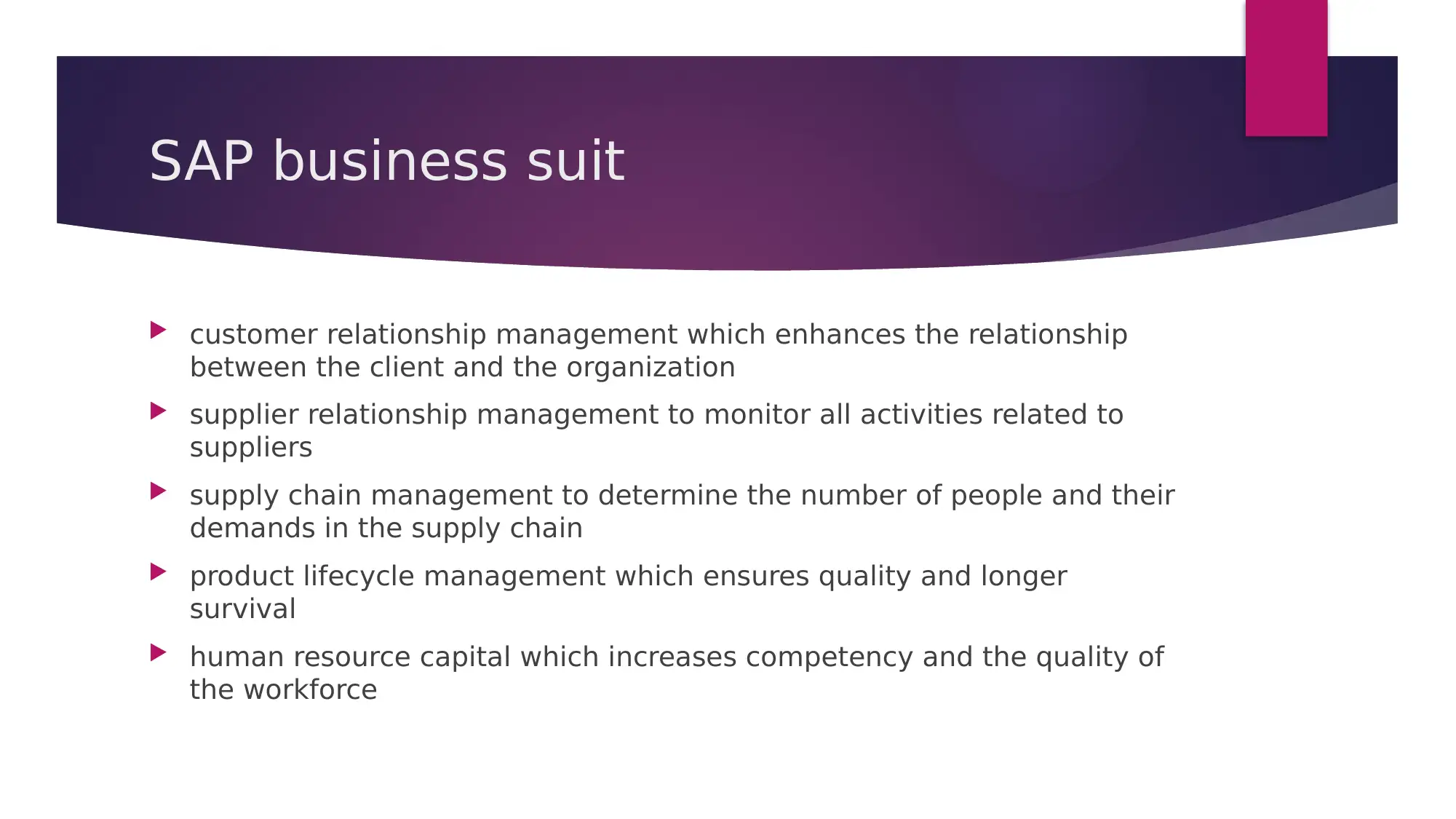
SAP business suit
customer relationship management which enhances the relationship
between the client and the organization
supplier relationship management to monitor all activities related to
suppliers
supply chain management to determine the number of people and their
demands in the supply chain
product lifecycle management which ensures quality and longer
survival
human resource capital which increases competency and the quality of
the workforce
customer relationship management which enhances the relationship
between the client and the organization
supplier relationship management to monitor all activities related to
suppliers
supply chain management to determine the number of people and their
demands in the supply chain
product lifecycle management which ensures quality and longer
survival
human resource capital which increases competency and the quality of
the workforce
Paraphrase This Document
Need a fresh take? Get an instant paraphrase of this document with our AI Paraphraser
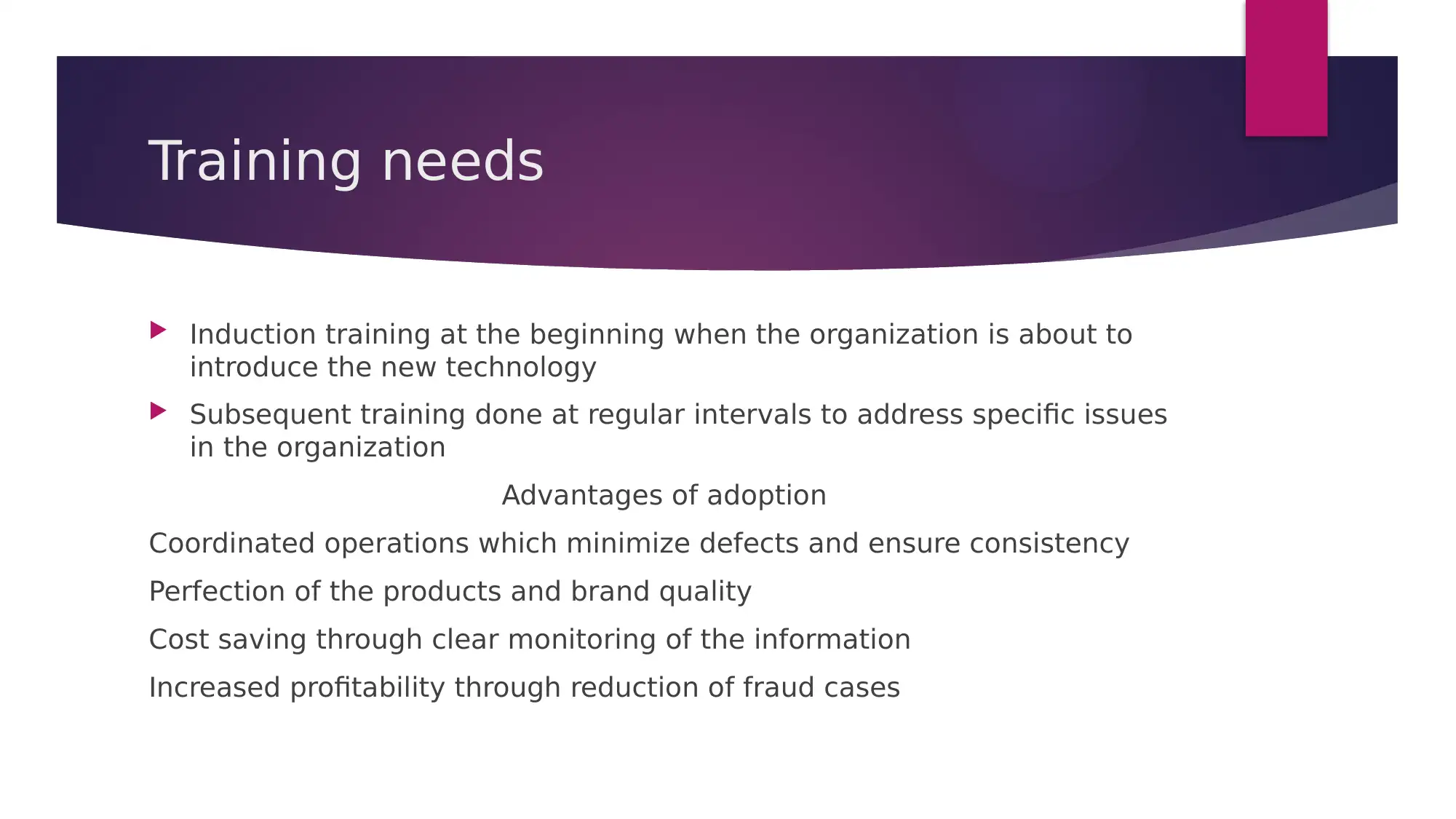
Training needs
Induction training at the beginning when the organization is about to
introduce the new technology
Subsequent training done at regular intervals to address specific issues
in the organization
Advantages of adoption
Coordinated operations which minimize defects and ensure consistency
Perfection of the products and brand quality
Cost saving through clear monitoring of the information
Increased profitability through reduction of fraud cases
Induction training at the beginning when the organization is about to
introduce the new technology
Subsequent training done at regular intervals to address specific issues
in the organization
Advantages of adoption
Coordinated operations which minimize defects and ensure consistency
Perfection of the products and brand quality
Cost saving through clear monitoring of the information
Increased profitability through reduction of fraud cases
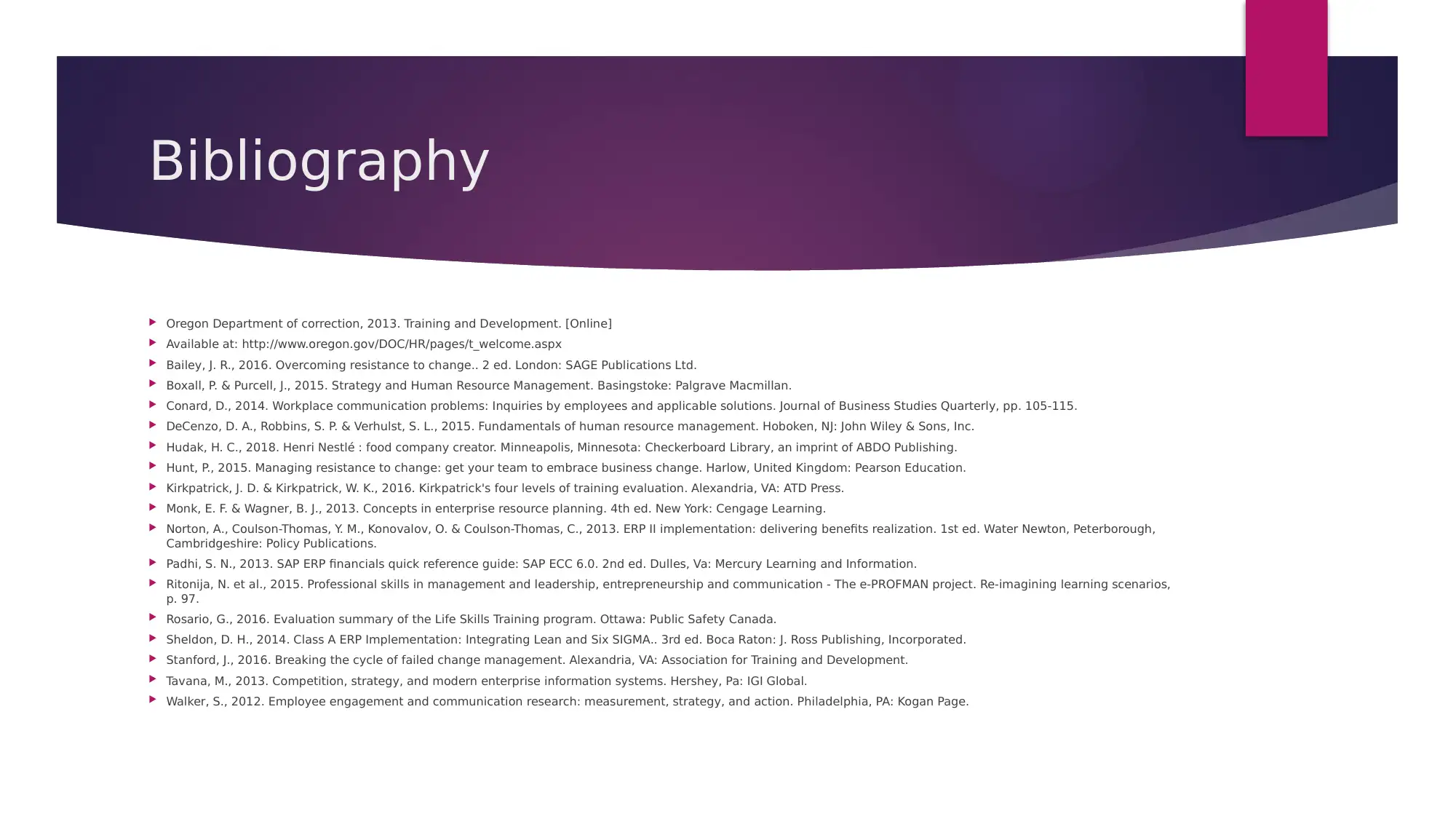
Bibliography
Oregon Department of correction, 2013. Training and Development. [Online]
Available at: http://www.oregon.gov/DOC/HR/pages/t_welcome.aspx
Bailey, J. R., 2016. Overcoming resistance to change.. 2 ed. London: SAGE Publications Ltd.
Boxall, P. & Purcell, J., 2015. Strategy and Human Resource Management. Basingstoke: Palgrave Macmillan.
Conard, D., 2014. Workplace communication problems: Inquiries by employees and applicable solutions. Journal of Business Studies Quarterly, pp. 105-115.
DeCenzo, D. A., Robbins, S. P. & Verhulst, S. L., 2015. Fundamentals of human resource management. Hoboken, NJ: John Wiley & Sons, Inc.
Hudak, H. C., 2018. Henri Nestlé : food company creator. Minneapolis, Minnesota: Checkerboard Library, an imprint of ABDO Publishing.
Hunt, P., 2015. Managing resistance to change: get your team to embrace business change. Harlow, United Kingdom: Pearson Education.
Kirkpatrick, J. D. & Kirkpatrick, W. K., 2016. Kirkpatrick's four levels of training evaluation. Alexandria, VA: ATD Press.
Monk, E. F. & Wagner, B. J., 2013. Concepts in enterprise resource planning. 4th ed. New York: Cengage Learning.
Norton, A., Coulson-Thomas, Y. M., Konovalov, O. & Coulson-Thomas, C., 2013. ERP II implementation: delivering benefits realization. 1st ed. Water Newton, Peterborough,
Cambridgeshire: Policy Publications.
Padhi, S. N., 2013. SAP ERP financials quick reference guide: SAP ECC 6.0. 2nd ed. Dulles, Va: Mercury Learning and Information.
Ritonija, N. et al., 2015. Professional skills in management and leadership, entrepreneurship and communication - The e-PROFMAN project. Re-imagining learning scenarios,
p. 97.
Rosario, G., 2016. Evaluation summary of the Life Skills Training program. Ottawa: Public Safety Canada.
Sheldon, D. H., 2014. Class A ERP Implementation: Integrating Lean and Six SIGMA.. 3rd ed. Boca Raton: J. Ross Publishing, Incorporated.
Stanford, J., 2016. Breaking the cycle of failed change management. Alexandria, VA: Association for Training and Development.
Tavana, M., 2013. Competition, strategy, and modern enterprise information systems. Hershey, Pa: IGI Global.
Walker, S., 2012. Employee engagement and communication research: measurement, strategy, and action. Philadelphia, PA: Kogan Page.
Oregon Department of correction, 2013. Training and Development. [Online]
Available at: http://www.oregon.gov/DOC/HR/pages/t_welcome.aspx
Bailey, J. R., 2016. Overcoming resistance to change.. 2 ed. London: SAGE Publications Ltd.
Boxall, P. & Purcell, J., 2015. Strategy and Human Resource Management. Basingstoke: Palgrave Macmillan.
Conard, D., 2014. Workplace communication problems: Inquiries by employees and applicable solutions. Journal of Business Studies Quarterly, pp. 105-115.
DeCenzo, D. A., Robbins, S. P. & Verhulst, S. L., 2015. Fundamentals of human resource management. Hoboken, NJ: John Wiley & Sons, Inc.
Hudak, H. C., 2018. Henri Nestlé : food company creator. Minneapolis, Minnesota: Checkerboard Library, an imprint of ABDO Publishing.
Hunt, P., 2015. Managing resistance to change: get your team to embrace business change. Harlow, United Kingdom: Pearson Education.
Kirkpatrick, J. D. & Kirkpatrick, W. K., 2016. Kirkpatrick's four levels of training evaluation. Alexandria, VA: ATD Press.
Monk, E. F. & Wagner, B. J., 2013. Concepts in enterprise resource planning. 4th ed. New York: Cengage Learning.
Norton, A., Coulson-Thomas, Y. M., Konovalov, O. & Coulson-Thomas, C., 2013. ERP II implementation: delivering benefits realization. 1st ed. Water Newton, Peterborough,
Cambridgeshire: Policy Publications.
Padhi, S. N., 2013. SAP ERP financials quick reference guide: SAP ECC 6.0. 2nd ed. Dulles, Va: Mercury Learning and Information.
Ritonija, N. et al., 2015. Professional skills in management and leadership, entrepreneurship and communication - The e-PROFMAN project. Re-imagining learning scenarios,
p. 97.
Rosario, G., 2016. Evaluation summary of the Life Skills Training program. Ottawa: Public Safety Canada.
Sheldon, D. H., 2014. Class A ERP Implementation: Integrating Lean and Six SIGMA.. 3rd ed. Boca Raton: J. Ross Publishing, Incorporated.
Stanford, J., 2016. Breaking the cycle of failed change management. Alexandria, VA: Association for Training and Development.
Tavana, M., 2013. Competition, strategy, and modern enterprise information systems. Hershey, Pa: IGI Global.
Walker, S., 2012. Employee engagement and communication research: measurement, strategy, and action. Philadelphia, PA: Kogan Page.
⊘ This is a preview!⊘
Do you want full access?
Subscribe today to unlock all pages.

Trusted by 1+ million students worldwide
1 out of 9
Related Documents
Your All-in-One AI-Powered Toolkit for Academic Success.
+13062052269
info@desklib.com
Available 24*7 on WhatsApp / Email
![[object Object]](/_next/static/media/star-bottom.7253800d.svg)
Unlock your academic potential
Copyright © 2020–2025 A2Z Services. All Rights Reserved. Developed and managed by ZUCOL.





